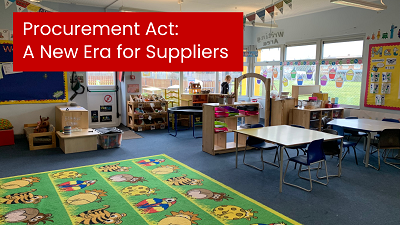Procurement Act 2023 - A New Era for Suppliers

The Procurement Act 2023, effective February 2025, opens new doors for small businesses in the education sector. By prioritising social value, the Act allows smaller suppliers to compete beyond cost, enhancing local community engagement and sustainability. Incensu's National Register of Education Suppliers supports this shift, connecting schools with innovative suppliers ready to deliver tailored solutions and drive meaningful change.
29 January 2025As the Procurement Act 2023 takes effect in February 2025, a new landscape of opportunities emerges for small businesses in the education sector. This legislation encourages schools to prioritise social value, opening doors for smaller suppliers to compete beyond the traditional focus on cost. Here’s how small businesses can seize this moment to make a significant impact.
Leveraging Social Value for Competitive Edge
The Procurement Act 2023 places a strong emphasis on social value, allowing small businesses to highlight their unique contributions to local communities. Unlike large corporations, smaller suppliers often have deeper connections with their local areas, making them ideal partners for schools looking to enhance community engagement. By showcasing how your products or services contribute to social, economic, and environmental well-being, you can differentiate your business from larger competitors.
Building Strong Local Relationships
Small businesses have the advantage of agility and personal touch, which can be leveraged to build strong relationships with schools. Engage with local schools to understand their specific needs and challenges. By offering tailored solutions and demonstrating a commitment to local development, you can establish trust and become a preferred supplier.
Utilising Incensu's National Register of Education Suppliers
Incensu's National Register of Education Suppliers is a powerful tool for small businesses to increase visibility and credibility. By creating a comprehensive profile, you can showcase testimonials, accreditations, and case studies that highlight your expertise and commitment to quality. This platform allows schools to search for suppliers based on location and specific needs, giving smaller businesses a chance to shine.
Innovative Solutions and Niche Markets
Small businesses can thrive by focusing on niche markets within the education sector. Whether it’s providing specialised educational tools, sustainable products, or innovative technology solutions, identifying and targeting specific needs can set you apart. The shift towards more holistic and practical education approaches presents opportunities for suppliers who can offer unique and adaptable solutions.
Networking and Collaboration
Participating in local and national education events can provide valuable networking opportunities. By attending conferences, workshops, and networking groups, small businesses can connect with key decision-makers and other suppliers. Collaborating with other local businesses can also enhance your offerings and expand your reach.
Emphasising Sustainability and Compliance
Schools are increasingly prioritising sustainability and compliance, making it essential for suppliers to demonstrate expertise in these areas. Highlight your commitment to sustainable practices and ensure compliance with health and safety standards. Display relevant accreditations and awards on your Incensu profile to build trust and credibility.
Conclusion
The Procurement Act 2023 offers a unique opportunity for small businesses to thrive in the education sector by focusing on social value and community impact. By leveraging local connections, offering innovative solutions, and utilising platforms like Incensu, smaller suppliers can compete effectively against larger corporations. Embrace this new era of procurement to make a meaningful difference in schools and local communities.
How do you plan to position your small business to take advantage of these opportunities?
Source: Incensu Education Marketing Resource
Incensu says: At Incensu, we recognise the tremendous opportunity for smaller, local suppliers as schools increasingly prioritise social value in their procurement decisions. This shift allows you to showcase your unique contributions to community well-being and sustainability. By aligning with schools' goals, you can become a trusted partner in driving positive change and fostering local growth. Let's seize this moment to make a meaningful impact together.
